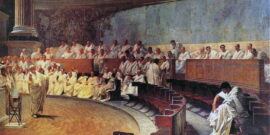Like the Roman Republic, the United States changed when the administrative state arose.
Sooner or Later, A Sovereign People Asserts Its Authority
Though American politics at the grassroots is polarized and divided, sharp commentators have written thoughtfully about the similarities between the parties as a practical matter. I would add that the similarities extend to their leaders.
While George W. Bush and Barack Obama could not be further apart ideologically, their attitudes toward governing suffer from the same flaw. Bush said he was “the Decider,” to which Obama rejoined: “I won.” Both ran roughshod over public opinion. This is not just a massive failure on the part of our parties to effectively advocate, explain or persuade on behalf of their respective understandings of what it means to be an American; it’s fair to say that we are witnessing contempt from both parties for the idea that persuasion is their primary role.
This misconception about the role of politics and parties is due, in part, to the ballooning of the modern administrative state, which has replaced government by consent with government by experts. As the putative head of this enormous band of experts, a President who—like most Americans today—lacks a clear understanding of the origins and purposes of American constitutionalism might be forgiven for imagining he is a kind of Caesar. Governing according to this habit tends, over time, to subvert consent, and Presidents lose their patience for explaining themselves to the people.
Having lost that patience, they soon lose even the natural concern an elected official should have for the people’s scorn. That, too, is left to experts. Today we have a whole class of people who know how to wrangle elections, woo interest groups, and cobble together electoral—if not exactly ideological—majorities. Some even put electronic sensors on groups of average Americans to monitor their emotional responses to candidates and issues.
Yet for all this malpractice in American constitutionalism, it remains that we do not elect sovereigns in America. We do not elect them because we, the People, are the sovereign. Radical actions taken without first taking time to build consensus will embitter the sovereign over time.
Put bluntly: Americans don’t like to be snubbed. This should give us some measure of hope. How can one not love this trait in one’s fellow Americans? We still have a spirit of wanting to be free, not subjects. We want to be persuaded, not told what to think. We think we can judge for ourselves when presented with a fair argument. Whatever experts may say, it remains unwise to embark on international adventures or attempt to “transform” a nation with a simple electoral majority. We may have a basic respect for experts and their degrees, but our trust in them has very definite limits.
This is why dismissing Trump’s appeal as voter anger misses something important. There is anger, sure. But to see only generic cynicism and ranting about “politics as usual” — and to dismiss it as emanating from the uninformed, safely to be disregarded—is facile and, like most facile conclusions, mistaken.
While it is possible that some of Trump’s support comes from people caught up in the moment and earnest in taking Trump as a serious candidate, it is instructive to instead suppose that many of them are in on the joke. There is a kind of pleading desperation in their political responses viewed in this light. Not only does the longtime celebrity know what he is about, with his trademark bombast, they know what they are about in giving him the lead in the primary polling. Wouldn’t it be wise to investigate what is behind voters’ desperation? What do they feel our politics is not addressing? (Hint: Immigration is only part of the story.)
Perhaps Trump’s legions are trying to tell us that the Republican Party actually deserves a clown as its standard-bearer. If not, at a minimum they are saying a clown is preferable to anything else on offer. As the pundits persist in their denunciations (with which, I should add, I am in basic agreement), Trump supporters take that as yet more proof that the party’s “elite” are, as ever, out of touch.
Does it ever occur to the leadership of either party that their most important job is to persuade more people of the merits of their respective platforms? Do they even read the platforms? The grassroots of both parties are tired of the same canned speeches pulled off the shelf for election-year fundraising. And those we like to call the “mushy middle” are often seated there because they long ago tired of this drivel or, in most cases, never warmed to it in the first place. Party leaders are wrong if they think this can go on indefinitely.
Sooner or later, after all, a sovereign will assert his authority. And when that happens, it may not be a salutary development. Often we do not assert our authority in the smartest way—as the outcome of many elections can attest. We seek persuasion but, in the tradition of most democracies, we too often settle for the best and loudest expression of our outrage.
Much of what may be said of Trump and the Republicans could apply to Democrats and their sudden love affair with Bernie Sanders. In this we see a repudiation of an establishment putting forward more entitled legacy candidates like Bush and Clinton to administer a federal bureaucracy that rewards well-connected friends with power and prestige. Meanwhile, Trump makes laughing stock of this establishment and hay with the voters as he brags about his ability to exploit and buy off politicians for his own purposes.
Democrats thought they were getting something different in 2008 with Barack Obama and, though it is a wonder to many on the Right, a good number of them are dissatisfied with his record on behalf of their ideology. While he pushed through legislation and filled the courts and bureaucracy with fellow travelers, he has not succeeded in winning converts. Our political polarization is as bad as it’s become in great part because neither party has done much serious work at building or deserving consensus on behalf of its ideas.
Party leaders do not seem to understand that it is not just that Democrats and Republicans disagree about policy prescriptions. They disagree fundamentally about the problems the policies are supposed to remedy—about the very ends and purposes of government. Living in a perpetual stalemate on such fundamentals is exhausting.
People are looking for an argument worth hearing. They sense that policy disputes will go nowhere if we can’t settle this larger problem first. But while both sides appear to be trying to choose a champion, both parties are churning up men and women ill-equipped for this battle.
President Obama turned out to be too smug to win over new supporters for anything longer than an election cycle. His determination to force people to accept their freedom as he understands freedom brought us the success of the Tea Party, and cost Democrats control of Congress. For Republicans, holding the House and Senate—two chambers where one expected to hear a more pronounced assertion of the party’s principles—instead appeared to demonstrate their weaknesses. In a country where so much of the legislative power is diluted and redistributed to a professional ruling class, even good rhetoric can be unpersuasive because it is often not followed by significant action. Couple this with the intentional check of the legislative power in the Presidential veto, and you’ve got a pretty emasculated representative of the public’s will.
Unfortunately, Republican leadership did little to explain to voters the complexity of trying to legislate in a government now dominated by an out-of-control administrative state. And they did even less to dismantle it. All they managed was a fair amount of whining about it.
Instead of appealing to the natural pride of self-governing citizens in a republic and inspiring them to resist the patronizing ways of a government that keeps them down and in their place, the GOP in 2012 insinuated that the culture of dependency among the infamous 47 percent made them incapable of self-government.
Where Democrats appeal to the superiority of supposed intellectual experts, Republicans appear to appeal to the superiority of rich guys.
Can voters be blamed for supposing that if we are going to have politicians with so little respect for self-government anyway, we might as well get behind someone who flatters, entertains, and channels a cathartic kind of manly sensibility that demands the attention of our betters?
Trump’s supporters know he is a destroyer. Sanders’ supporters know the same about their socialist champion. The truth that should frighten the elites of both parties is that destroyers are exactly what these Americans think America needs.
Political parties don’t last forever, but voters do. Well . . . they last at least as long as republics do.


